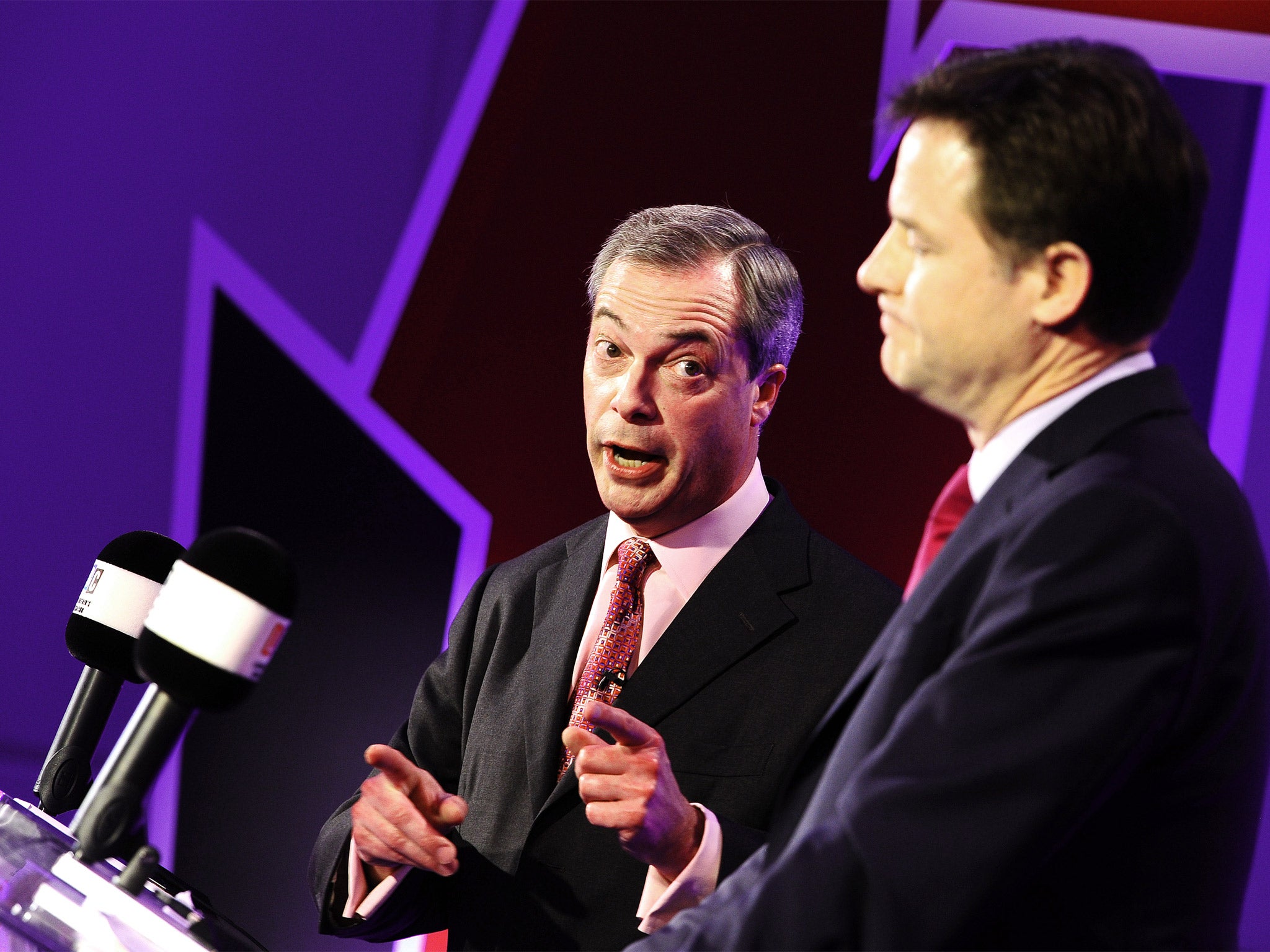Nigel Farage and Nick Clegg clash over immigration during live debate, but neither can land the killer blow
Lib Dems and Ukip inevitably split over who won, but agree that the Tories and Labour were the losers

Nick Clegg tried to match the UK Independence Party's trump card of immigration as he went head-to-head with Nigel Farage on whether Britain should remain in the European Union.
In the first of two live broadcast debates, the Liberal Democrat leader said the British people deserved "the facts" on immigration as he accused Ukip of trying to "scare people." He brandished a Ukip leaflet claiming that 29m people could come to Britain from Romania and Bulgaria, more than the total number of people living in those two countries.
A post-match YouGov survey of 1,003 people found that 57 per cent believed that Mr Farage had performed best, while 36 per cent thought Mr Clegg had won. Among Conservative supporters, the Ukip leader was judged the winner by a margin of 3-1. Mr Farage also came top among Labour voters, by 51 to 42 per cent. Surprisingly, one in five (20 per cent) of Lib Dem supporters thought Mr Farage had won, while 77 per cent named Mr Clegg the winner.
Neither leader landed a killer punch in the hour-long debate, staged by the LBC radio station and screened by Sky News. Mr Farage won louder applause from the audience but Mr Clegg, using his experience of Britain's first TV leaders' debates at the 2010 general election, looked more relaxed.
Inevitably, both the Lib Dems and Ukip claimed victory. The Lib Dems said their man had won "hands down" the battle of the facts and figures, while Ukip hailed a "great breakthrough", claiming it had taken over the leadership of Britain's Eurosceptic majority.
The two leaders clashed over immigration, as the Deputy Prime Minister took head-on the issue which is believed to have boosted Ukip's appeal much more than its desire to leave the EU. Mr Clegg argued that migrants made a net contribution of £22bn between 2001 and 2011 to the country through taxes, saying the NHS would collapse overnight if the UK "pulled up the drawbridge." He insisted that nine out of 10 new jobs being created in the UK went to British people.
But Mr Farage accused him of evading the crucial question: that EU membership meant Britain having an "open door" to 480m people.
Mr Clegg repeatedly warned that leaving the EU would cost jobs, with more than 3m linked to trade with the EU. "I am not prepared to see anyone lose their job on the altar of Nigel Farage's anti-EU dogma," he declared. The Ukip leader retorted that the only "dogma" he believed in was the British people deciding their own fate. He claimed that 75 per cent of the UK's laws were now made in Brussels, while Mr Clegg put the figure at 7 per cent. The Lib Dem leader disputed Mr Farage's claim that the UK paid a £55m-a-day bill for its EU membership, which did not take account of the rebate won by Margaret Thatcher.
Although some exchanges were heated, the debate did not descend into personal insults. Mr Farage did say that Mr Clegg had never had a "real job," in contrast to his own 20 years in the private sector. Mr Clegg retorted that the two men became MEPs on the same day, that he had left the European Parliament after five years while Mr Farage was still a member 15 years on.
The Ukip leader confirmed he still opposed gay marriage, even though his party recently he had changed his mind, saying he might think again if the power of the European Court of Human Rights was diluted.
Although aides to David Cameron and Ed Miliband claimed the two leaders were not watching, Conservative and Labour strategists will wonder whether they might be punished for opting out of the first big debate on Europe since the UK's 1975 referendum.
Lib Dem and Ukip officials believe both parties believe both could emerge as winners, as they both have the capacity to prise some voters away from Labour and the Tories. Although the Lib Dems and Ukip were never going to agree on who won, they did agree that the Tories and Labour were the losers.
Who won on social media
Independent.co.uk Political Correspondent Felicity Morse weighs up the contenders after appearing on Sky News' coverage of the debate
Nigel Farage won the debate on Twitter, especially as no one seemed to pick up his pro-Kremlin line towards the end of the speech. He was a bit sweaty and frothy, which Twitter did pick up on, but he also came across as believing in what he was saying and I think that showed.
Overall in the debate, however, it was an even draw, with lots of people backing Clegg over gay marriage and there was a spike in social activity around that time.
It will be interesting to see how the parties max out their social media policies next time...This time the Lib Dems definitely came off worse!
Subscribe to Independent Premium to bookmark this article
Want to bookmark your favourite articles and stories to read or reference later? Start your Independent Premium subscription today.

Join our commenting forum
Join thought-provoking conversations, follow other Independent readers and see their replies